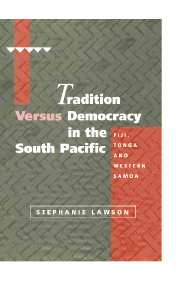Book contents
- Frontmatter
- Contents
- List of Maps
- List of Tables
- Preface
- Epigraph
- The South Pacific
- Introduction
- Chapter 1 Tradition and Democracy
- Chapter 2 Constitutional Development, Chiefly Power and the Politics of Tradition in Fiji
- Chapter 3 The Monarchy Versus Democracy in the Kingdom of Tonga
- Chapter 4 Preserving Tradition Through Democratization: The Introduction of Universal Suffrage in Western Samoa
- Chapter 5 Conclusion: Tradition Versus the West
- Notes
- Bibliography
- Index
Chapter 1 - Tradition and Democracy
Published online by Cambridge University Press: 22 September 2009
- Frontmatter
- Contents
- List of Maps
- List of Tables
- Preface
- Epigraph
- The South Pacific
- Introduction
- Chapter 1 Tradition and Democracy
- Chapter 2 Constitutional Development, Chiefly Power and the Politics of Tradition in Fiji
- Chapter 3 The Monarchy Versus Democracy in the Kingdom of Tonga
- Chapter 4 Preserving Tradition Through Democratization: The Introduction of Universal Suffrage in Western Samoa
- Chapter 5 Conclusion: Tradition Versus the West
- Notes
- Bibliography
- Index
Summary
The Idea of Tradition
Although Pacific Island nations have vernacular expressions which broadly encapsulate the idea of a unique body of cultural traditions, the word ‘tradition’ (together with ‘custom’) is most commonly used, especially by political elites. We shall therefore explore the idea of tradition initially in terms of its anglophone understanding. The Latin root of the English word ‘tradition’ denotes several possible meanings, but its general understanding in contemporary English usage is related to processes involving the passing on of knowledge and doctrine from one generation to the next. Although this understanding carries no necessary normative force, it is nonetheless open to conveying, at the same time, a strong commitment to the idea that what has been transmitted from the past to the present is worthy of respect, and enjoins a duty of observance on the present generation. Similarly, it has been suggested that a tradition of belief contains an inherently normative component which functions to elicit almost automatic affirmation of whatever state of affairs is apparently produced or endorsed by the tradition. This implies that whatever has been received from the past is to be valued in the present, as well as carried forward by the generation which follows. Krygier has elaborated these ideas in the context of three essential characteristics which he ascribes to tradition. First, the contents of a tradition are imbued with a certain ‘pastness’ – or at least its participants believe that the origins of the tradition lie deep in the past.
- Type
- Chapter
- Information
- Tradition versus Democracy in the South PacificFiji, Tonga and Western Samoa, pp. 10 - 36Publisher: Cambridge University PressPrint publication year: 1996

